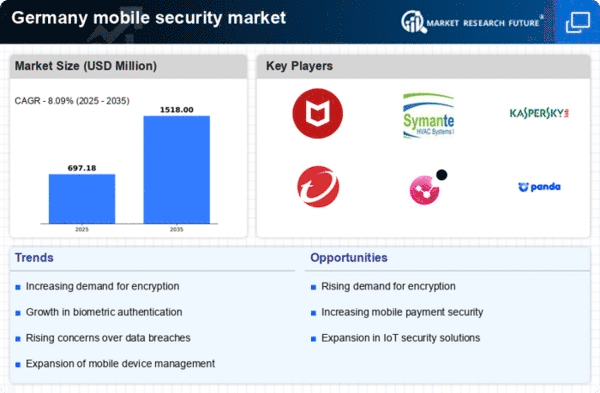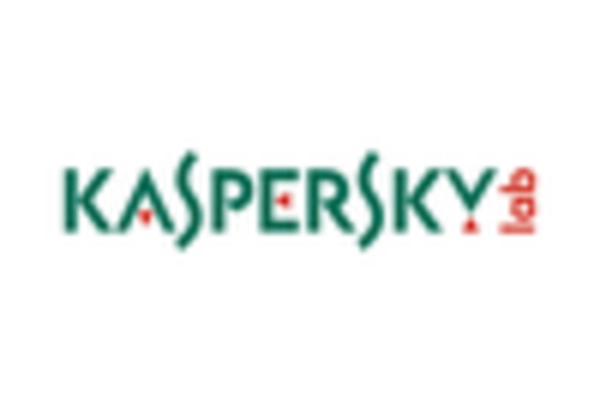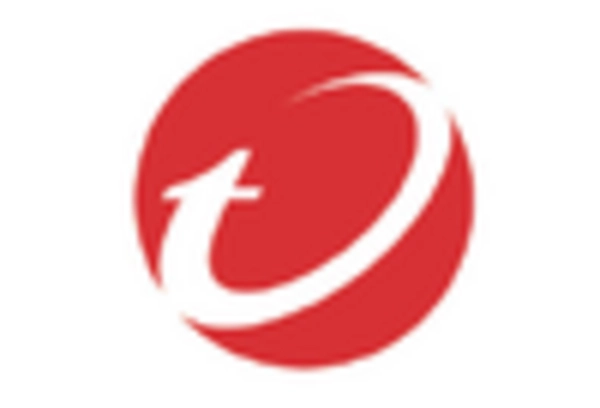Rising Mobile Device Usage
The proliferation of mobile devices in Germany is a key driver for the mobile security market. With over 80% of the population owning smartphones, the reliance on mobile technology for personal and professional activities has never been greater. This widespread adoption creates a fertile ground for cyber threats, as users often engage in sensitive transactions via mobile applications. Consequently, businesses are compelled to implement comprehensive mobile security solutions to protect their customers and themselves. The mobile security market is projected to grow by 20% in response to this trend, as organizations prioritize the security of mobile devices to mitigate risks associated with data breaches and identity theft. The increasing integration of mobile devices into daily life underscores the necessity for enhanced security measures.
Increased Regulatory Scrutiny
The mobile security market in Germany is significantly influenced by the increasing regulatory scrutiny surrounding data protection and privacy. With the implementation of stringent regulations such as the General Data Protection Regulation (GDPR), organizations are compelled to adopt robust mobile security measures to ensure compliance. Failure to adhere to these regulations can result in hefty fines, which can reach up to €20 million or 4% of annual global turnover, whichever is higher. This regulatory environment is driving businesses to invest in mobile security solutions that not only protect user data but also ensure compliance with legal requirements. The mobile security market is expected to grow by 12% as companies prioritize compliance and risk management in their mobile operations. The emphasis on regulatory adherence is a crucial driver for the mobile security market.
Growing Cyber Threat Landscape
The mobile security market in Germany is experiencing heightened demand. This is due to an increasingly complex cyber threat landscape. Cybercriminals are employing sophisticated tactics, leading to a surge in mobile malware and phishing attacks. In 2025, it is estimated that mobile malware attacks could rise by 30%, prompting organizations to invest heavily in security solutions. This trend indicates a pressing need for robust mobile security measures to protect sensitive data and maintain consumer trust. As businesses and individuals become more aware of these threats, the mobile security market is likely to expand significantly, with a projected growth rate of 15% annually. Safeguarding mobile devices against evolving threats is a primary driver for the mobile security market in Germany.
Emergence of Remote Work Culture
The shift towards remote work in Germany has created new challenges for mobile security, thereby driving the market. As employees increasingly rely on mobile devices to access corporate networks and sensitive information from remote locations, the risk of data breaches has escalated. Organizations are recognizing the need for comprehensive mobile security solutions to protect against unauthorized access and data leaks. This trend is expected to propel the mobile security market, with a projected growth rate of 14% as companies invest in secure mobile access solutions, including Virtual Private Networks (VPNs) and Mobile Device Management (MDM) systems. The emergence of remote work culture necessitates a reevaluation of mobile security strategies, making it a pivotal driver for the mobile security market in Germany.
Demand for Secure Mobile Payment Solutions
The mobile payment sector in Germany is witnessing exponential growth, with transactions expected to reach €100 billion by 2026. This surge in mobile payment adoption is driving the mobile security market, as consumers and businesses alike seek secure methods for financial transactions. The rise of contactless payments and digital wallets has heightened the need for advanced security protocols to protect sensitive financial information. As a result, companies are investing in mobile security solutions that offer encryption, biometric authentication, and fraud detection capabilities. The mobile security market is likely to see a growth rate of 18% as organizations strive to ensure the safety of mobile payment systems. This demand for secure mobile payment solutions is a significant factor influencing the mobile security market in Germany.
















